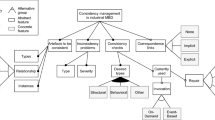Abstract
Consistency is a quality required by many approaches to the design of systems. In our practice we have found that keeping the business models consistent is one of the most difficult and critical tasks in corporations. Therefore we decided to explore this issue and its causes in a qualitative study. This paper discusses approaches to mutual consistency between business models, and proposes original concept of weak and strong mutual model consistency, independent on modeling language. The consistency is studied in one large corporate business process model and its evolution through the years by a case study and ethnographical observation methods. Relevant model types and its important consistency relations are described. Then an influence of various factors to consistency is narrated as a result of observations. Three factors with impact to mutual consistency are drawn: complexity, relation between evolving business and stagnant model, and modeling purpose.
Access this chapter
Tax calculation will be finalised at checkout
Purchases are for personal use only
Preview
Unable to display preview. Download preview PDF.
Similar content being viewed by others
References
Sayer, K., Harvey, L.: Empowerment in Business Process Reengineering: An Ethnographic Study of Implementation Discourses. In: Proceedings of the Eighteenth International Conference on Information Systems, pp. 427–440. Association for Information Systems, Atlanta (1997)
Yin, R.K.: Case study research: design and methods (2014)
Myers, M.: Investigating Information Systems with Ethnographic Research. Commun. AIS 2 (1999)
Sharp, H.: deSouza, C., Dittrich, Y.: Using Ethnographic Methods in Software Engineering Research. In: Proceedings of the 32nd ACM/IEEE International Conference on Software Engineering, vol. 2, pp. 491–492. ACM, New York (2010)
Passos, C., Cruzes, D.S., Dybå, T., Mendonça, M.: Challenges of Applying Ethnography to Study Software Practices. In: Proceedings of the ACM-IEEE International Symposium on Empirical Software Engineering and Measurement, pp. 9–18. ACM, New York (2012)
Yourdon, E.: Modern Structured Analysis. Prentice-Hall Inc., Englewood Cliffs (1989)
Marca, D.A., McGowan, C.L.: SADT: structured analysis and design technique. McGraw-Hill Book Co., Inc., New York (1988)
Downs, E., Clare, P., Coe, I.: SSADM, Applications and Context. Prentice-Hall, Inc., Upper Saddle River (1987)
Ashworth, C.M.: Structured systems analysis and design method (SSADM). Inf. Softw. Technol. 30, 153–163 (1988)
Gray, J., Reuter, A.: Transaction Processing: Concepts and Techniques. Elsevier Science (1992)
Rumbaugh, J., Blaha, M., Premerlani, W., Eddy, F., Lorensen, W.: Object-Oriented Modeling and Design. Prentice-Hall Inc., Englewood Cliffs (1991)
Egyed, A.: Instant Consistency Checking for the UML. In: Proceedings of the 28th International Conference on Software Engineering, pp. 381–390. ACM, New York (2006)
Ryndina, K., Küster, J.M., Gall, H.C.: Consistency of Business Process Models and Object Life Cycles. In: Kühne, T. (ed.) MoDELS 2006. LNCS, vol. 4364, pp. 80–90. Springer, Heidelberg (2007)
Repa, V.: Consistency in the Business System Model. In: Druzovec, T., Jaakkola, H., Kiyoki, Y., Tokuda, T., Yoshida, N. (eds.) Information Modelling and Knowledge Bases XXI, pp. 247–257. IOS Press, Amsterdam (2010)
Repa, V.: Information Modeling of Organizations. Bruckner Publishing, Zivonin (2012)
von Bertalanffy, L.: An Outline of General System Theory. Br. J. Philos. Sci. 1, 134–165 (1950)
Bruckner, T., et al.: Tvorba informacnich systemu: principy, metodiky, architektury. Grada Publishing, Praha (2012)
Directive 2003/55/EC of the European Parliament and of the Council of 26 June 2003
Directive 2009/73/EC of the European Parliament and of the Council of 13 July 2009
Business Process Model and Notation (BPMN) Version 2.0, http://www.omg.org/spec/BPMN/2.0/
Boulding, K.: General Systems Theory. Management Science 2(3), 197–208 (1957)
Author information
Authors and Affiliations
Editor information
Editors and Affiliations
Rights and permissions
Copyright information
© 2014 Springer International Publishing Switzerland
About this paper
Cite this paper
Bruckner, T., Repa, V., Chlapek, D. (2014). Consistency Issues in Large Business Process Model Environment, a Case Study. In: Johansson, B., Andersson, B., Holmberg, N. (eds) Perspectives in Business Informatics Research. BIR 2014. Lecture Notes in Business Information Processing, vol 194. Springer, Cham. https://doi.org/10.1007/978-3-319-11370-8_13
Download citation
DOI: https://doi.org/10.1007/978-3-319-11370-8_13
Publisher Name: Springer, Cham
Print ISBN: 978-3-319-11369-2
Online ISBN: 978-3-319-11370-8
eBook Packages: Computer ScienceComputer Science (R0)




